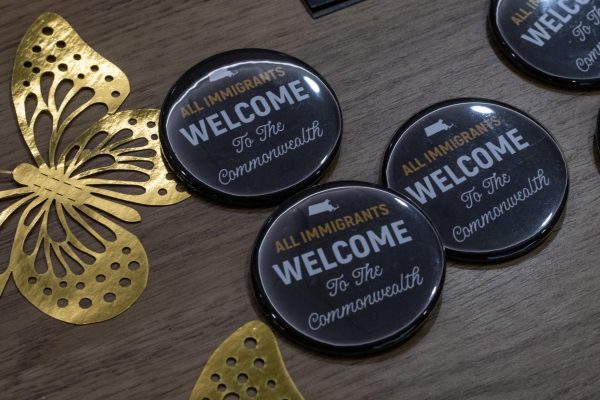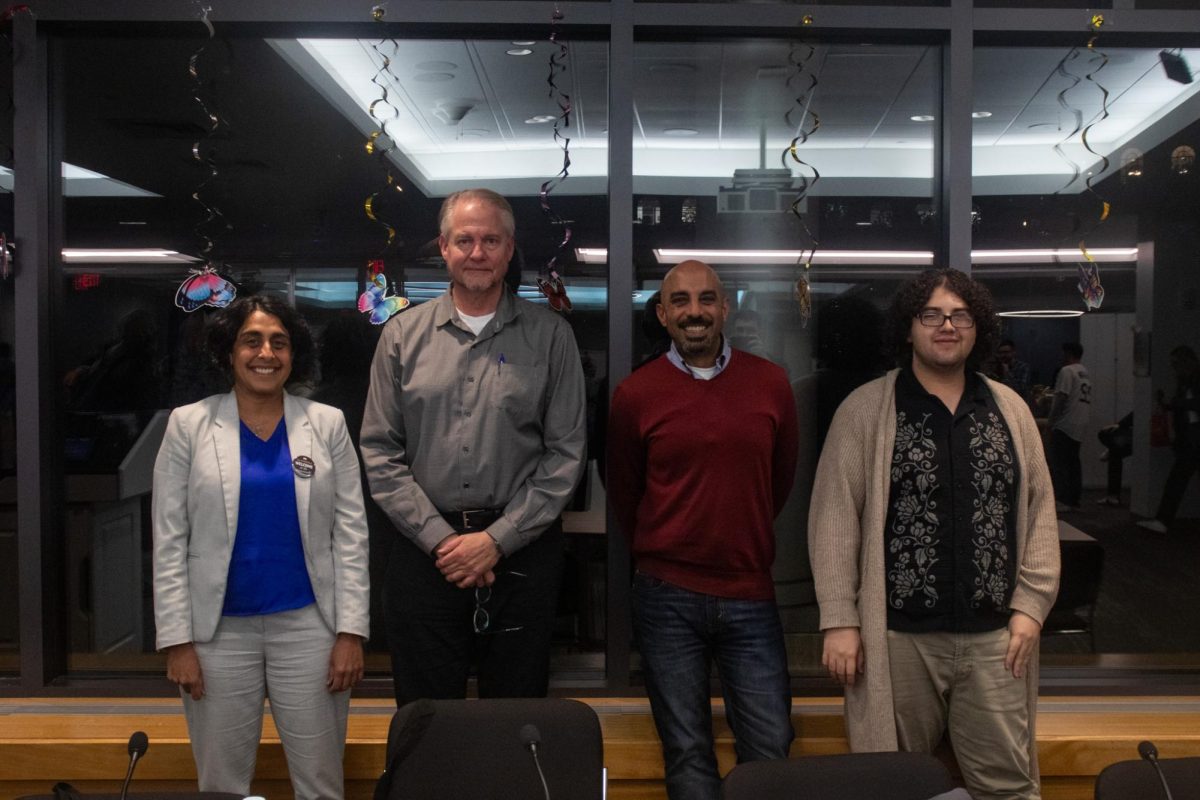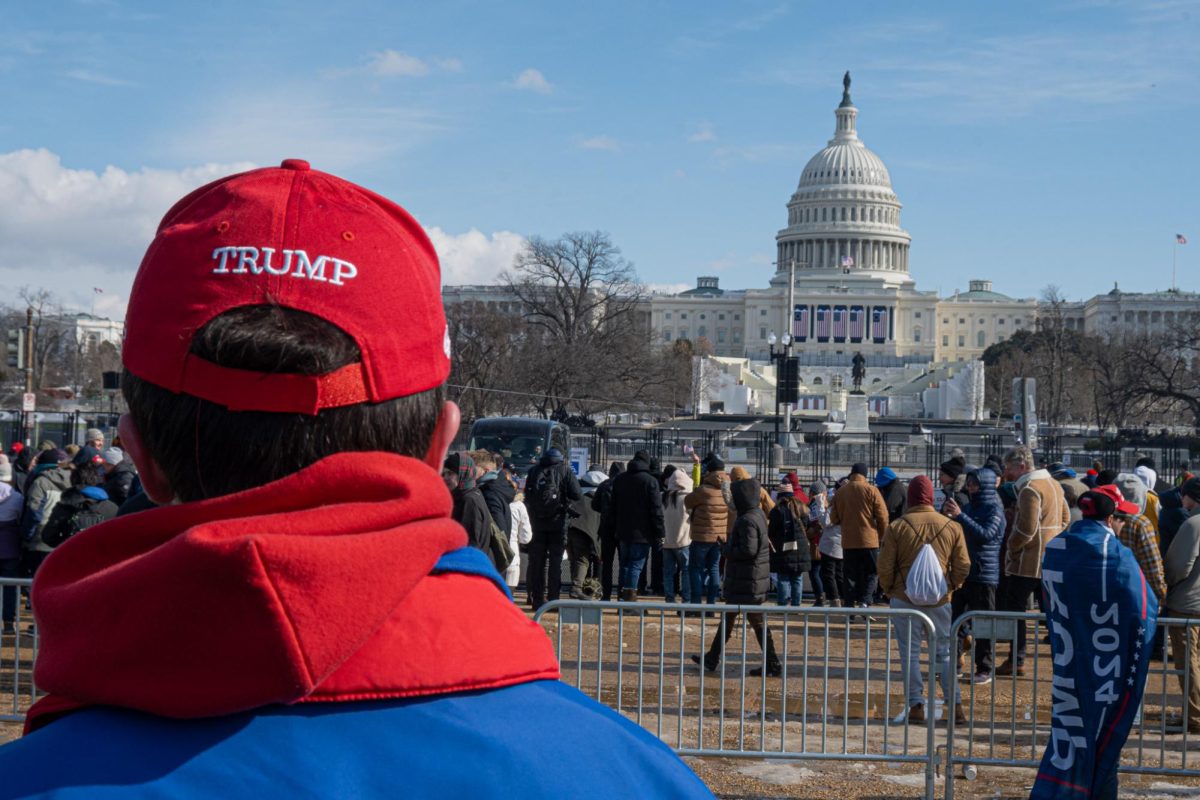As part of Suffolk University’s annual Undocu Week, students had the opportunity to attend “Project 2025: Implications for Immigrant Communities,” a panel discussion Oct. 30 on the state of the current United States immigration system and proposed policies under a Republican president.
The panel was comprised of Suffolk law professors Jeffrey Pokorak and Ragini Shah, director of the Immigrant Justice Clinic at Suffolk; Sarang Sekhavat, chief of staff for the Massachusetts Immigrant and Refugee Advocacy Coalition and Cristian Dubon Solis, program director for Stories Inspiring Movements.
Co-sponsored by the Center for Student Diversity and Inclusion, the Immigrant Justice Clinic and National Lawyers Guild, the panel was hosted in the Smith Commons at Sargent Hall.
Jack Slania, president of Suffolk Law School’s Immigrant Law Association, and Shah led the four panelists in discussion before questions were taken from the audience.
Shah provided an overview of the current field of immigration law, in which she identified the primary branches of government and agencies that make and enforce the laws governing immigration. Depending on the immigration case, there are many different agencies — including the Department of Labor and U.S. Immigration and Customs Enforcement — that can have jurisdiction over who enters the U.S.
One of the proposed immigration policies in Project 2025 would impose strict limitations on H-2B and H-1B visas, which grant temporary status to noncitizens based on their employment. Severely restricting these programs would create “significant” supply chain issues, Shah said, because of the amount of immigrants who work in fields like technology or agriculture.
“Employers want immigrant labor, and they are not going to fill those jobs, particularly the agricultural jobs, with people who are already in the United States,” said Shah.
Shah said slowing down H-1B visas would make it harder for international students to stay in the U.S. after graduating from university, even with a job offer. Other visa restrictions proposed in Project 2025 would “undermine the ability of law enforcement” to investigate crimes when witnesses fear their immigration status will be used to detain them after reporting a crime, according to Shah.
Relating to constitutional law, Pokorak noted the changes proposed in Project 2025 would likely create a “unified executive,” or a president who is the leader of the executive branch of government and controls everything within it. Government agencies, like the Department of Justice, fall under the executive branch but act independently under current law.
Pokorak said the concept of a unified executive clashes with the administrative state that governs the U.S.— necessary to serve the needs of hundreds of millions of people living in the country — and would result in inconsistent regulation and enforcement of laws.
“The country is a very complicated thing with many moving parts,” said Pokorak.
With more power, the president would have more influence on law enforcement’s actions, Pokorak said. Additionally, the current Supreme Court heavily favors the president having increased authority, said Pokorak, and would likely rule for the president if legal challenges came to the Supreme Court.
In their work with community organizations, Sekhavat and Dubon Solis have seen rising fear about the immigration system and the policies outlined in Project 2025 from the constituents they serve.
To prepare for policy changes that could be made under conservative leadership, MIRA has led “know your rights” training for immigrants and allies as well as compiled stories to be used in litigation.
“We need to show the real impact on the ground,” said Sekhavat.

Providing the necessary information to prepare someone to protect themselves and their family in the “worst-case scenario” is incredibly important, Sekhavat said.
For Dubon Solis, who came to the U.S. from El Salvador as a toddler and was discouraged from speaking about his undocumented status due to fear of family separation, amplifying the voices of immigrants is key to combating misconceptions and harmful rhetoric.
“Stories can be used both to heal and to harm,” said Dubon Solis. “If I do not speak out in front of people like I’m doing today, who will know that?”
Both Sekhavat and Dubon Solis emphasized the importance of creating spaces to share anxieties people may have about the future and acknowledged that those feelings will not disappear, but having an outlet for them can lessen the negative impacts.
For people who support immigrants and immigration, it is usually not the policy they feel the strongest about, Sekhavat said. He said it is important to show up for immigrant communities and be loud about supporting them.
“Part of it is really trying to get the silent support to not be silent and to get folks out there with those communities so people see ‘oh, there is support for us here,’” said Sekhavat.
There are numerous ways to advocate for immigrant and undocumented communities, from volunteering and participating in local events to pushing back against xenophobic rhetoric in everyday conversation. Sekhavat also encouraged supporting immigrant-owned businesses, but noted that commodifying immigrants to the food or services they provide can be dehumanizing.
While it can be difficult to speak out, Dubon Solis said it is important to show allyship with immigrants and undocumented people to push for progress and hold leaders accountable.
“Allyship and being in solidarity with groups is not easy, and it should not be easy, because it takes a village to make a change,” said Dubon Solis.
Audience Q&A
Q: I saw [former President Donald] Trump say earlier this week that on day one he plans to do the biggest mass deportation in U.S. history, and his justification was the Enemy Aliens Act…is it really possible to do this under law?
Sekhavat: The devil is always in the details. The last time Trump was president, there were members of the administration who would push back on a lot of these things. Now you’re not going to have nearly as much as that. Without major funding and policy changes, the kind of things that they’re talking about wouldn’t be legal. But then again, they did things last time that weren’t really legal either.
Pokorak: To add to the constitutional law side of this, what he proposes and the way he proposes it is repudiated at this point I would say — Korematsu — although not as clearly as I would like. The idea that you would round up U.S. citizens, which would inevitably happen in this, that’s part of his plan, not only immigrants without status but immigrants who are disloyal, inappropriate. Like for example, the military would have to be used, and that can’t really happen under current law.
Q: If [Trump] does win and Project 2025 is enacted, how soon would you anticipate these policies being put in place, especially with the state of the Supreme Court right now?
Pokorak: I think that some of it could be done very quickly, but a lot of it cannot be. Some of it can be done immediately but will be held up fast.
Sekhavat: One of the easiest things I think they’ll be able to do is just get rid of any priorities for enforcement. They did that before, it’s not something that’s difficult for them to do. We’re going to see lawsuits filed pretty quickly. They’re more prepared than they were eight years ago, but so are we. I think we were really caught flat-footed last time and I think the legal community has more experience on our side.
Q: What doesn’t change if Kamala [Harris] is elected? What part of the fight doesn’t change regardless of who becomes president?
Dubon Solis: No matter what happens, I think a lot of the policies in Project 2025—whether it’s the deportations or the border security—and even other policies that are a little bit more lenient or supportive of immigrants like DACA or TPS, these are all band-aid solutions. There will still be ways for people to come in and be undocumented. I think a lot of the conversations have shifted to “what can we do immediately” instead of “what can we do in the long term to make sure this is not happening.”
Sekhavat: I think one thing we could see in the Harris administration is we would still see asylum under attack. The Biden administration has really tried to roll back a lot of protections, a lot of due process for asylum seekers. There was a bill back in February that basically would have rewritten the asylum process, making it much, much more difficult for people to access the process itself. Harris said she would support that bill. So there’s a lot of concern among us that we’ll see our asylum system basically destroyed.
Shah: In Massachusetts, we have a one hundred percent Democratic delegation to Congress, but not a lot of leadership on immigration issues. For those of us who live here in the Commonwealth, we could really be pushing our congressional leaders to make sustainable changes to immigration.





















